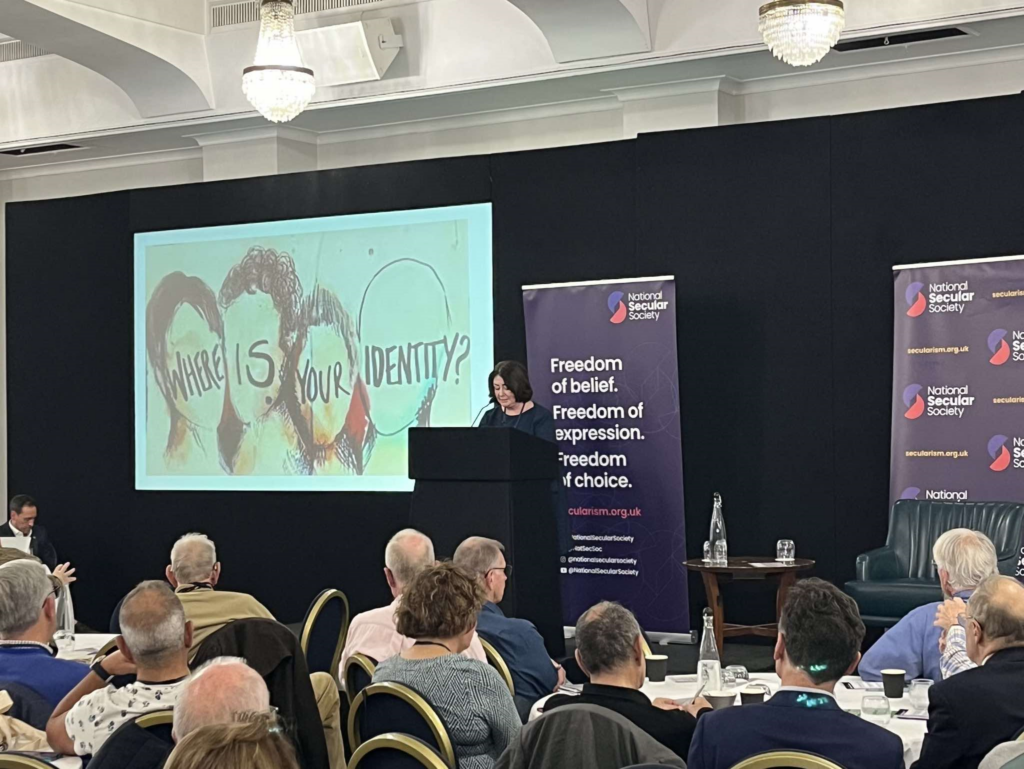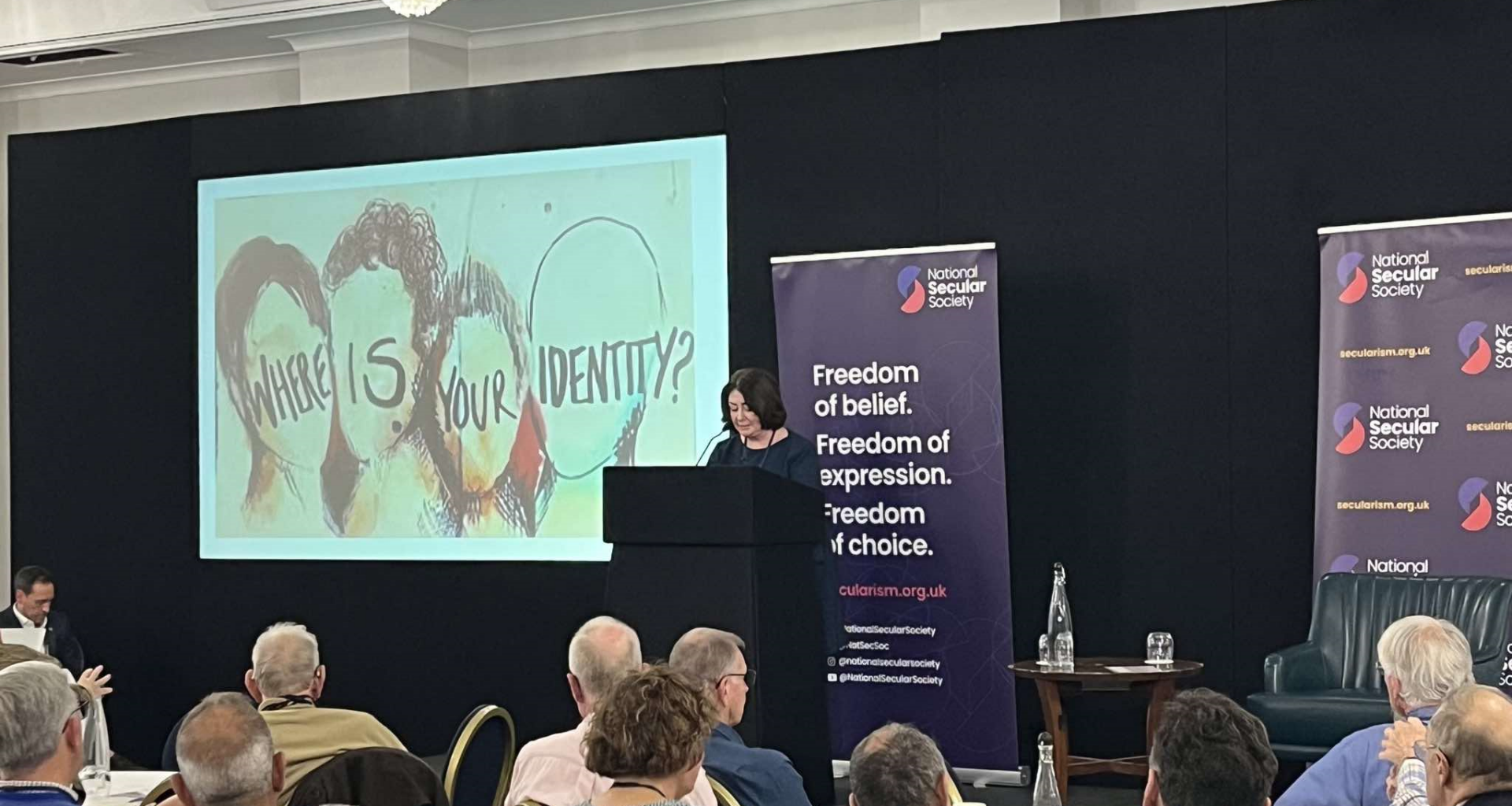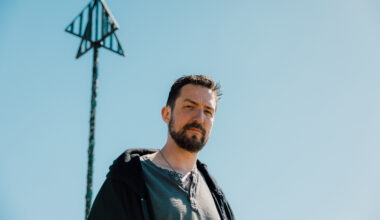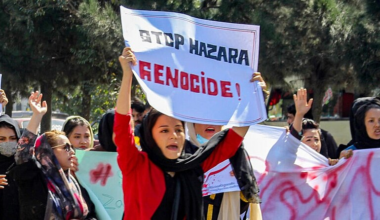This is an edited version of Maryam Namazie’s keynote address made at the National Secular Society conference on 19 October 2024.

I know identity politics well. Criticise Islam and Islamism, you are deemed an ‘Islamophobe’ by Islamists and their apologists on the pro-Islamist Left. Defend Muslims, refugees, and migrants and you are deemed to be an ‘undercover jihadi’ by the far-right.1
Identity politics demands conformity. Stay within the confines imposed by the identitarians, or else.
The suffragette, civil rights, anti-apartheid, and anti-colonial movements were about fighting for equality and emancipation, solidarity across borders and constructed boundaries. Now it is all about policing identities to ensure authenticity and purity.
Are you an authentic member of the group or are you a ‘race traitor’, a ‘coconut’, a ‘native informant’? What’s your ‘tribe of origin’? Identity has become the means and the end and everything in between. It is the subversion of the fight for social justice. It degrades liberatory struggles to a mere defence of one constructed identity and a homogenised ‘community’ or society based on myths like racial purity. There is no pure race, however. Race is a ‘concept whose very lack of definition [is] its virtue’, says author Kenan Malik in his 2023 book Not So Black and White. ‘It could be applied to peoples, nations, language groups… Race, like God, [is] always on your side.’ So why the insistence on categorising by race, if it is a human construct? ‘The motives are clear’, says science journalist Angela Saini in Superior: The Return of Race Science (2019). Proponents are ‘reaching for something, anything to reinforce the hierarchies they already believe exist and to establish what they see as the superiority of one group of people over another.’
It’s dehumanising. We’re not talking about human beings anymore—people with innumerable identities in a world of global migration. Salman Rushdie’s The Satanic Verses was, as he described it, ‘a love-song to our mongrel selves’, celebrating ‘hybridity, impurity, intermingling, the transformation that comes of new and unexpected combinations of human beings, cultures, ideas, politics, movies, songs.’
Now there are only singular, pure, authentic identities. And if you are deemed to be of an inferior identity, well, expect the worst. Collective blame and revenge are legitimate and even desirable. Innumerable human beings drowning in our seas and dying at our borders trying to gain refuge? They deserved it; they should have stayed put. Hundreds of civilians slaughtered by the fascist Hamas in Israel on 7 October? Apparently, the chickens came home to roost. Genocide by the Israeli far-right government murdering and wounding hundreds of thousands of Palestinian civilians? Well, they are ‘animals’, per the Israeli defence minister, so it’s all okay.
Every hour of every day, this has become the familiar language used against the ‘other’. The Untermensch, or subhuman, a term coined by the Nazis to refer to those deemed inferior. For now, poor and working-class migrants and Muslims top the inferiority bill.
Douglas Murray, for example, says: ‘All immigration into Europe from Muslim countries must stop… Conditions for Muslims in Europe must be made harder across the board.’ (I’m one of them, by the way. And for your information, these are not ‘Muslim countries’ any more than Britain is a Christian country. The states are Islamic, but these regimes are highly contested by many.)
In her 2021 book Prey, Ayaan Hirsi Ali places migrant men into four categories: adapters (whom she says are ‘a minority’), menacing types, fanatics, and coasters (those presumably on welfare). And by Muslim migrants, she means ‘new arrivals seeking asylum’ and ‘the sons and even grandsons of immigrants’. These are my father, my uncles and cousins, my family, my friends, my partner, my sons.
Even the Great Replacement theory of the ‘savage East’ replacing the ‘civilised white West’ that used to be the remit of the National Front and the British National Party is now perpetrated by the likes of Douglas Murray, Nigel Farage, Tommy Robinson, Donald Trump, and Elon Musk in mainstream media. Farage’s breaking point poster is similar to Nazi propaganda but apparently, he is just raising ‘legitimate concerns.’ (As an aside, even the categorisation of whiteness has changed according to political interest. Nancy Isenberg’s 2016 book White Trash shows how poor and working-class whites were classified as a ‘distinct breed’ of ‘inferior animal stock’ and targeted by Theodore Roosevelt for sterilisation.)
Identity politics takes the blame away from the state and power structures, including capitalist economic structures and patriarchal structures, and places collective blame on the inferior ‘other’. It’s not government strategies, anti-poor and working-class policies, low minimum wage, high energy costs, austerity, privatisation, cuts, low taxation of the rich, militarism, genocide, or crimes against humanity that are to blame, but migrants. Migrants are vilified for everything from failures of the NHS to traffic jams, ‘trumpeting the “big lie” that accidents of birth do convey innate, biological superiority’, as James O’Brien writes in How They Broke Britain (2021).
Identity politics is usually referred to as ‘woke’, but it is very much the mainstay of the extreme right and now even the mainstream xenophobic right. The politics of difference has always been a fundamental principle of a supremacist agenda, whether it is Nazism, the biological theory of racial superiority, or, as we see now, expressions of difference couched in cultural and religious terms.
According to Iranian Marxist Mansoor Hekmat,
The religious, cultural, ethnic and national categorisation of people is always the first step in denying their universal rights as human beings. If the genocide in Rwanda is the continuation of an African tradition, if stoning is the Iranian people’s Islamic tradition…then they can really be forgotten, humiliated, bombed and left to the mercy of their own rules beyond the fortresses of western civilisation and democracy.
Orientalism, the essentialising of the East, comes from a deep-rooted belief in the existence of a fundamental ontological difference in the essential nature of Western and Eastern societies. And of course, Islamists simply replicate the difference between East and West but this time to the advantage of the East and Islam; Syrian philosopher Sadik Jalal al-’Azm calls this ‘orientalism in reverse’, and notes that it is ‘no less reactionary, mystifying, ahistorical and anti-human’.
As Ayatollah Khomeini has said: ‘the word Islam does not need adjectives such as democratic. Precisely because Islam is everything, it means everything. It is sad for us to add another word near the word Islam, which is perfect.’ A lot of us from ‘Muslim backgrounds’ beg to differ. But criticise the Islamists and Islam, and you can end up being imprisoned and even executed if you live under their rule (hence one of the reasons why there are so many refugees fleeing from those countries). Here in the West, though, you are accused of ‘Islamophobia’ by the Islamists and their regressive identitarian apologists in order to silence and censor.
The ‘unholy alliance in Europe between Muslim fundamentalists and the “Coward Left” cum Human Rights groups that together build up “Muslimness” as a transnational ethno-cultural identity’ (‘much to the delight of fundamentalists’) is denounced by Algerian sociologist Marieme Hélie Lucas. ‘It is becoming an unwashable “original sin”, a stamp on the skin and soul of the people whose accidental location of birth makes them “Muslims”.’
‘…Identity politics is the perfect alchemist’s trick’, as Rahila Gupta of Southall Black Sisters has said. ‘It manages to construct power as powerlessness, to present itself as the homogenous and authentic voice of interest groups. It projects a victimhood which needs empowering through the preservation of regressive cultural or religious traditions that do not tolerate dissent.’ (Gupta, personal communication, 2024)
Cinzia Scuito, editor of MicroMega has said: ‘One hears it repeated that we have to defend “our western” values. The truth is that the “West” is—like all other civilisations in the world—filled with contradictions. If human rights and democracy are “Western” so are totalitarianism, slavery, barbarism.’ (Scuito, personal communication, 2024)
Author Sathnam Sanghera in his book Empireland (2021) says that the British Empire was ‘one of the biggest white supremacist enterprises in the history of humanity’. I would add: the religious right (whether Jewish, Hindu, Christian, Buddhist, Sikh, or Islamic) is one of the biggest male supremacist enterprises in the history of humanity.
Gods and religions hate women. In religions, a woman is a deviant form of man. In Islam and Islamic states, for example, to be a woman is a sin. Anything that benefits women is haram. Her hair, body, dance, voice, disobedience, resistance, religiously unprescribed sex, free thinking… Blasphemous. Haram. Sin.
Say it and you are accused of racism by those who equate criticism of an idea, Islam, and a far-right political movement, Islamism, with bigotry against Muslims. This can only happen in an age where the authentic Muslim is always a fundamentalist.
In Islam and Islamic states, anything that is violence and hate against women is halal. Compulsory veiling and sex apartheid, halal.2 Child marriage, halal. Marital rape, polygamy, domestic violence, all halal. Stoning, halal.
Of course, I’m not saying all cultural practices are equal or equally valid but inferior values are not in someone’s DNA because of where they were born. No community, population, or society is a monolith. Those in power determine the dominant culture and often use force to impose it, hence why so many resist and flee.
Moreover, culture isn’t static. It’s constantly changing and being revised, reviewed, and challenged. ‘In recent decades, with the short-sighted promotion’ of the ‘right’ to ‘difference’, Marieme Hélie Lucas has said that ‘many have glorified segregation between humans to the point where we have lost sight of our universality. Building walls between us in the name of a more and more narrow presumed or imposed identity ultimately aims at weakening our common force for change, for social justice and for personal self-fulfilment.’ (Lucas, personal communication, 2024)
‘To mobilise on the basis of narrow and rigid forms of national, cultural and religious identity is to descend into moral and political degeneracy that threatens the very core of our humanity’, Pragna Patel of Project Resist has said. ‘Ultimately, freedom from the tyranny of religion, racism, patriarchy and poverty will come not from the politics of identity but from the politics of solidarity.’ (Patel, personal communication, 2024)
Essentialising people into mythological identities fails to recognise social and political movements, class politics, resistance, and dissent. It becomes all about policing boundaries and not about the fight for equality and liberation. It erases the struggles in both East and West that benefit all of humanity.
Let me give you one example. In 1886, a confrontation between police and workers protesting for an eight-hour day in Chicago’s Haymarket Square ended in a number of workers killed and four executed. The Haymarket Affair became a symbol of the international struggle for workers’ rights and the date on which the strike that led to it began, 1 May, was designated International Workers’ Day in 1889. As a result, this day is celebrated worldwide with the slogan ‘workers of the world unite’ (not ‘white workers in little small-minded England unite’). Today, workers in Iran, for example, are flogged, imprisoned, and tortured for celebrating May Day. In the US, where it all started, Labour Day is held in September, not May.
In The Book of Embraces (1989), Uruguayan author Eduardo Galeano writes:
Arriving in the Haymarket district, I ask my friends to show me the place where the workers whom the world salutes every May 1st were hanged in 1886. “It must be around here,” they tell me. But nobody knows where. No statue has been erected in memory of the martyrs of Chicago in the city of Chicago. Not a statue, not a monolith, not a bronze plaque. Nothing. May 1st is the only truly universal day of all humanity… but in the US, May 1st is a day like any other… On that day, no one, or almost no one, remembers that the rights of the working class did not spring whole from the ear of a goat, or from the hand of God or the boss.
Take any important gains for people’s rights. They are the product of human struggle, our quest for equality, liberation, and dignity, all things that contradict the homogenised identity politics of West versus East or the absurd theory of the ‘Clash of Civilisations.’
On International Women’s Day in 1979, when the Islamic regime in Iran began rolling out its policy of compulsory veiling, women chanted ‘Women’s Rights are neither Western nor Eastern but Universal.’ As I have said before, Iran is not a ‘Muslim country’, as the white nationalists and the pro-Islamist Left would have you believe. The state is a theocracy, a dictatorship. There are Muslims in Iran as there are other religious minorities. Having a religion is not the same as wanting to be ruled by religious law. There are also countless atheists. In fact, the regime has spoken of the need to combat a tsunami of atheism and secularism.
Since September 2022, when the regime’s revolutionary guards murdered a young Iranian Kurdish woman named Mahsa Jina Amini for a few strands of hair—they said she was improperly veiled—the world has been inspired by the courageous fight-back of a Generation Z that has no illusions about an Islamic state. The slogan ‘Woman, Life, Freedom’ (first raised in Rojava in Syrian Kurdistan, a centre of secularism in the middle of a war zone) has become global via a woman-led revolution in Iran. It’s supported by men who understand that women’s freedom is the measure of freedom in a society. This woman’s revolution has secular, modern, anti-clerical, and even anti-religious characteristics. When we speak of the culture of the East, remember too that it includes hijab burning and turban flying.
‘The idea of universality is the very framework that upholds human rights’, One Law for All’s Gita Sahgal has said. ‘In an age, when nations and ideologies openly defend mass extermination, and complete dehumanisation, the struggle for human rights underpinned by universality is more urgent, more necessary than it has ever been.’ (Sahgal, personal communication, 2024)
Identity politics, with its poverty of empathy and imagination, is killing us. Confronting what is essentially a repackaged strategy of divide and rule and defending a politics of solidarity, universality, and our common humanity is a historical task. Our very lives depend on it.
- Here, for example, are just a few examples of the attacks I have faced from all sides:
Maryam Namazie of the Council of Ex-Muslims of Britain is a hate preacher, FivePillars
A notorious Islamophobe, Islamic Society of Goldsmiths and its LGBTQ Society
Islamophobic, Sheffield Transformed and East London Mosque
A harlot and corrupt woman, Islamic regime of Iran’s state-run media Enghelab News
The New McCarthyites, Deepa Kumar, Professor of Media Studies at Rutgers University
Antisocial, even dangerous, David Shariatmadari of Guardian
Distressing and objectionable, TedX
An obscure communist activist who claims to campaign against Islamism, but has found common cause with the Islamists, Douglas Murray
No more anti-jihad than Hassan Nasrallah, Robert Spencer
Gives free hugs to the Taliban, Pegida – Patriotic Europeans Against the Islamisation of the West
Marxist anti-Semitic ‘anti-jihad’ activist, Jihad Watch
↩︎ - Compulsory veiling is integral to sex apartheid. It is segregation based on sex, as in Afghanistan, a hell for women created by the Taliban with Western government support. A campaign of which I am a signatory is calling for gender apartheid to be deemed a crime against humanity just like racial apartheid. ↩︎
Related reading
Islamic identity politics is a threat to British democracy, by Khadija Khan
‘We need to move from identity politics to a politics of solidarity’ – interview with Pragna Patel, by Emma Park
Defending liberalism: interview with Helen Pluckrose, by Daniel James Sharp
Israel’s war on Gaza is a war on the Palestinian people, by Zwan Mahmod
The ‘Women’s Revolution’: from two activists in Iran, by Rastine Mortad and Sadaf Sepiddasht
The Taliban’s unceasing war on Afghan women, by Khadija Khan
A Small Light: Acts of Resistance in Afghanistan, by Zwan Mahmod









1 comment
Okay, identity politics are divisive. That is convincing. But this is very rhetorical and MN makes some pretty sweeping claims that are apparently based on assumptions that are not argued for, or raise unanswered questions.
What exactly is her position on immigration to the UK? Does she think it should be unlimited? If so, that is quite extreme. She doesn’t address the concerns that many normal people (and not just the benighted “natives”) have about how it is being managed.
Does she think, like a true communist, that everything is about the class struggle? If so, is that not identity politics of a different type?
Is there a simple moral equivalence between right-wing and left-wing identities? In Britain – not the US, where it is different – are they all just as bad as each other?
In “the fight for equality and liberation”, who exactly is fighting who for what?
And should “Western values” just be the dismissed out of hand, in a quote?
Your email address will not be published. Comments are subject to our Community Guidelines. Required fields are marked *
Donate